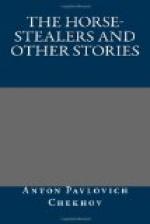“It’s an owl at the little birds,” says Syoma, gloomily.
“Why, Syoma, it’s time for the birds to fly to the warm countries!”
“To be sure, it is time.”
“It is chilly at dawn now. It is co-old. The crane is a chilly creature, it is tender. Such cold is death to it. I am not a crane, but I am frozen. . . . Put some more wood on!”
Syoma gets up and disappears in the dark undergrowth. While he is busy among the bushes, breaking dry twigs, his companion puts his hand over his eyes and starts at every sound. Syoma brings an armful of wood and lays it on the fire. The flame irresolutely licks the black twigs with its little tongues, then suddenly, as though at the word of command, catches them and throws a crimson light on the faces, the road, the white linen with its prominences where the hands and feet of the corpse raise it, the ikon. The “watch” is silent. The young man bends his neck still lower and sets to work with still more nervous haste. The goat-beard sits motionless as before and keeps his eyes fixed on the fire. . . .
“Ye that love not Zion . . . shall be put to shame by the Lord.” A falsetto voice is suddenly heard singing in the stillness of the night, then slow footsteps are audible, and the dark figure of a man in a short monkish cassock and a broad-brimmed hat, with a wallet on his shoulders, comes into sight on the road in the crimson firelight.
“Thy will be done, O Lord! Holy Mother!” the figure says in a husky falsetto. “I saw the fire in the outer darkness and my soul leapt for joy. . . . At first I thought it was men grazing a drove of horses, then I thought it can’t be that, since no horses were to be seen. ‘Aren’t they thieves,’ I wondered, ’aren’t they robbers lying in wait for a rich Lazarus? Aren’t they the gypsy people offering sacrifices to idols? And my soul leapt for joy. ’Go, Feodosy, servant of God,’ I said to myself, ’and win a martyr’s crown!’ And I flew to the fire like a light-winged moth. Now I stand before you, and from your outer aspect I judge of your souls: you are not thieves and you are not heathens. Peace be to you!”
“Good-evening.”
“Good orthodox people, do you know how to reach the Makuhinsky Brickyards from here?”
“It’s close here. You go straight along the road; when you have gone a mile and a half there will be Ananova, our village. From the village, father, you turn to the right by the river-bank, and so you will get to the brickyards. It’s two miles from Ananova.”
“God give you health. And why are you sitting here?
“We are sitting here watching. You see, there is a dead body. . . .”
“What? what body? Holy Mother!”
The pilgrim sees the white linen with the ikon on it, and starts so violently that his legs give a little skip. This unexpected sight has an overpowering effect upon him. He huddles together and stands as though rooted to the spot, with wide-open mouth and staring eyes. For three minutes he is silent as though he could not believe his eyes, then begins muttering:




